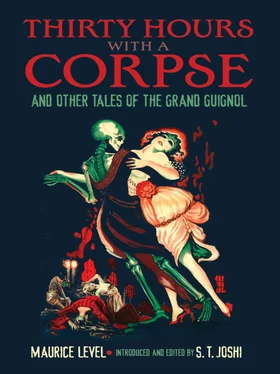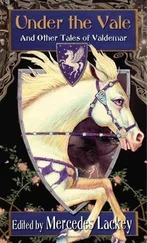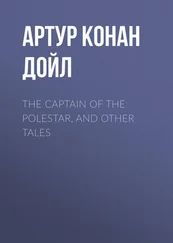“Of course I saw something of it in the papers. Who didn’t? Some lady of easy virtue stabbed in the middle of the night—”
“In broad daylight,” his wife corrected him.
“In broad daylight, as you wish. Money, jewels stolen—such crimes occur every day—”
“It’s very mysterious,” she insisted.
“Ah!” he sighed, “how you do love mystery!”
And he resumed reading Le Temps. His wife addressed the other traveler, eager to prove her point:
“To think that someone rang the poor woman’s door while she was being killed!”
“Eh? What makes you think that?” the old gentleman asked.
“That’s probable,” she declared. “Not a jewel missing, yet they were right there, within reach. Two magnificent rings were found on her dressing-table, with a gold purse and a diamond pin. Not a single one of the precious trinkets on the shelves was touched or taken. Only the money. There was no disorder. The murderer must have been frightened away by some noise, for he fled without taking time to collect all the loot. The crime did not earn him much!”
“Oh, yes, Madame, it did!” The old man nodded in selfapproval. “It was one of the most profitable crimes committed in recent years. And the assassin took his time, believe me.”
“Then why did he leave the jewels?”
“Simply because he was an intelligent man who reasoned that the coin and banknotes he stole could not be identified, while jewels, whether you keep them or sell them, lead to eventual discovery and arrest. The telegraph, telephone, radio, have complicated the task of the criminal. Just remember that he can be reported at once to ships at sea, arrested, and held before having a chance to land in a country refusing extradition.”
“And this murderer,” the wife resumed, “figured out this job in advance so thoroughly that he will not be found for a long time?”
“He—” the old gentleman paused, smiled quietly—”will never be caught.”
I had been amused by my companions’ eagerness to talk. I had expected to be drawn in by a question, a glance. To my own astonishment, I spoke without thought, unguardedly. Perhaps I can stand isolation no better than the next man, perhaps lingering vanity, the pride of having something new, authentic to bring into the discussion, prompted me.
“That’s not so certain as it was yesterday,” I declared.
They had not expected me to speak. The young woman started, the old man turned toward me suddenly, and the young man’s eyes met mine above the newspaper.
“Yet,” insisted the old man, “I’ve read everything concerning this case, followed it with great attention in a dozen newspapers and failed to see anything to make me believe that—”
“Because the clue of which I speak is most recent,” I replied. “It will not be in the papers until tomorrow.”
“Are you a reporter, Monsieur?” the young woman asked me with quick curiosity.
“No, Madame. But I’m well informed, nevertheless. I was called in as medical expert. During the first inspection of the premises, only one fact was evident, for the room in which the woman was killed happened to be quite dark, and that was that the victim had been slain with a single stabbing blow in the chest.
“But when the corpse was brought to me for autopsy at the morgue, I discovered a rather large stain under the left breast, a reddish spot that appeared to be shaped like a hand. I took a photograph of this stain, treated the negative to make it sharper, clearer, and when I obtained a print, I saw that it was indeed the design of a human hand, of a long, slim hand, so precise that not a detail, not a crease, not a line, not a single fingerprint was lacking.”
“Perhaps one of the policemen who lifted the body touched it,” the old gentleman said slowly. “Such people wear no gloves. I grant that it may be the trace of a dirty hand, but admit it may be that of an innocent hand.”
At this, the young man who was reading laughed. I did not take offense, aware that it was customary to laugh at the theories of physicians in general and of medical experts in particular. Moreover, I was sure of my facts, so I continued my demonstration.
“Where the human eye might be mistaken, chemistry makes no error. That stain was made by blood. It is very faint, I admit, but it is a bloodstain nevertheless. Naturally, I immediately ascertained that it did not match the hand of any of the persons who had entered the room since the discovery of the crime.
“Also, a moist towel was found on the washstand, very soiled, and it did not take much imagination to reconstruct that part of the crime. The murderer killed with a single, clean stab, that is true, but he found his right hand covered with blood. He wiped it on the towel. When about to leave, he wished to make sure that his victim was quite dead, ready to dispatch her with another blow.
“He laid his hand over her heart. When he did not feel the slightest beat, he left as he had come, noiselessly. Unfortunately for him, he had forgotten that blood sticks to skin tenaciously, and that, without knowing it, he had placed on his work the least questionable of signatures.”
“Extraordinary,” the young woman breathed.
“Very curious, as a matter of fact,” her husband added.
As for the old gentleman, he murmured: “Bah! Unless the killer’s fingerprints are on record in the police files, that’s a worthless clue. If I were the assassin, I would sleep in peace!”
“Tonight, perhaps!” I resumed. “But not tomorrow. For all the newspapers will reproduce the picture I took in the morning. Throughout France tomorrow, throughout Europe within two days, that hand will be known and sought for. And the murderer will be betrayed by his right hand, unless he decides to wear gloves all his life, or, showing heroism in his own fashion, he strikes it off himself at the wrist.
“For that hand, aside from the characteristics that would be sufficient for any expert to know it from all other right hands, has a marking that calls attention when you see it. A scar, running from the end of the ring-finger to the base of that line which palmistry terms ‘life-line.’ A scar which must be so plain that it cannot be unnoticed. So, God forbid, if one of us were the murderer and chanced to draw off his gloves, there would be every chance in the world for you, gentlemen, for me, to identify that hand immediately and ask for the man’s arrest at the next station.”
“Oh!” the young woman gasped.
The two men stared at their gloved hands instinctively.
“And,” the younger man spoke, “that photograph is to appear in the morning papers?”
“We’ll see it when we arrive?” the old gentleman wondered.
“No,” I explained, “the print was given to the press only tonight, and the Paris papers won’t reach us until tomorrow.”
My information appeared to have disturbed the young woman. She spoke after a moment of hesitation, yielding to curiosity:
“I’d like to see it.”
“Nothing easier than that,” I assured her. “I have a print in my briefcase. Here it is.”
She took it.
Her husband looked over her shoulder. The old gentleman, after murmuring: “Will you permit me?” crossed the compartment and sat at her side for a closer glance. All three stared at the print intently. Such attention tensed their faces that I might have believed they were staring at the real hand. But as the light was not too strong, I leaned over to indicate the details.
“See that white streak? Isn’t it clear? That’s the scar, see? And over here—”
“Growing stuffy in here,” the young man said. “Mind if I open the window?”
He slid the pane of glass into its groove in the door panel, and cool air rushed in. The old man wiped his forehead and said: “Oh, how good that feels!”
Читать дальше












